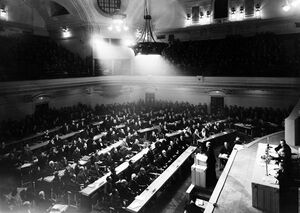Melasian Crisis
This article is incomplete because it is pending further input from participants, or it is a work-in-progress by one author. Please comment on this article's talk page to share your input, comments and questions. Note: To contribute to this article, you may need to seek help from the author(s) of this page. |
| Melasian Crisis | |||||||
|---|---|---|---|---|---|---|---|
| Part of the Great Game | |||||||
 Session of the Assembly of Nations in January 1942 addressing the Melasian Crisis | |||||||
| |||||||
| Belligerents | |||||||
|
Supported by: |
Supported by: | ||||||
| Commanders and leaders | |||||||
|
|
| ||||||
| Strength | |||||||
|
1,895,800 |
1,135,400 | ||||||
| Casualties and losses | |||||||
|
|
| ||||||
The Melasian Crisis (Hesurian: Melasien-Krise, Cuthish: X), also known as the Great Crisis, Mid-Century Crisis or Melasian War (Hesurian: Melasienkrieg) in Mascylla, was a confrontation between the Cuthish State and Mascylla in Berea following a Mascyllary intervention in the politics of the state of Melasia, which resulted in armed confrontations both in Melasia and, briefly, in Berea. The crisis is often considered the closest the Great Game would come to a full scale war, comparable in scale only to the Great War of the first half of the century.
After several years of internal instability, Melasia would formally receive independence from Mascylla in 1921, however, the terms of the conducted treaty left the country bound to its former metropoly. Following a shift of the international politics of Melasia in the 1930s and 1940s under its President Wilhelm Keller, the country began to break its relations with its former metropoly, Mascylla, and a totalitarian regime began to gain power within the country. Melasian international activity, especially its close relations with Cuthland, started to threaten the Mascyllary colonial presence in the region. Following a complete violation of the Independence Treaty of 1921 by Keller, Mascylla declared war on the country and attempted an attack on its capital. The Mascyllary fleet conducted a naval blockade of the country with the intention to starve its economy and enforce negotiations on its own terms.
Mascyllary actions were recognised as intervention in the Melasian internal affairs by a number of countries, namely Cuthland. As a result, a full-scale mobilization was conducted in the country. On 16 May, 1941, Mascylla was given an ultimatum to stop all hostilities against Melasia by the Cuthish delegacy in the Assembly of Nations, which was ignored by Mascyllary officials. Four days later Cuthland declared war on Mascylla with limited action across the northern border of the countries. In the same time, Mascyllary troops in Melasia saw direct confrontation with the local militias and the small regular army of the country. With the escalation of the conflict becoming imminent, a meeting in the Council of Nations was convened by the Valimian President Eemil Hyvälempi in an attempt to regulate the crisis and stop the hostilities in Berea. Following almost two years of negotiations, with several restarts of the armed hostilities in Melasia and on the Cutho-Mascyllary border, Mascylla was forced to leave Melasian territorial waters, while the Cuthish territorial gains in Mascylla were rejected. Agreements on several points, however, were not reached: the proposed demilitarized zone on the Cutho-Mascyllary border was vetoed by several communist countries, namely Dulebia, leaving the border dispute in Berea open. Formally, the crisis ended on 5 September 1943, with the establishment of the first diplomatic mission between Cuthland and Mascylla since the end of the Great War.
The Melasian Crisis had wide reaching effects that led to a major realignment of the international system for the first time since the Great War. With Cuthland reemerging as a great power, Berea would see an end to the unipolarity established after the Great War, with the Mageiros League emerging as the new equivalent of the Central Alliance from the first decades of the century, leading to a new round in the Great Game. As a result of the poor communication between the former Armala Coalition members during the crisis, and in a responce to the rising tensions on the continent, the Berean Defence Treaty Association was formed by several countries and was tasked with the protection of peace one year after the end of the crisis. The crisis also showed a deterioration of the relations between Cuthland and several communist countries and the shift of communist diplomacy towards the former Armala League Berean nations. The swift actions of the international community is often credited as the main reason why the crisis did not escalate into a major armed conflict, as was the case only three decades earlier. The actions of the Assembly of Nations is seen by historians as the peak of international diplomacy in the 20th century and an ethalon of diplomacy in times of crisis.